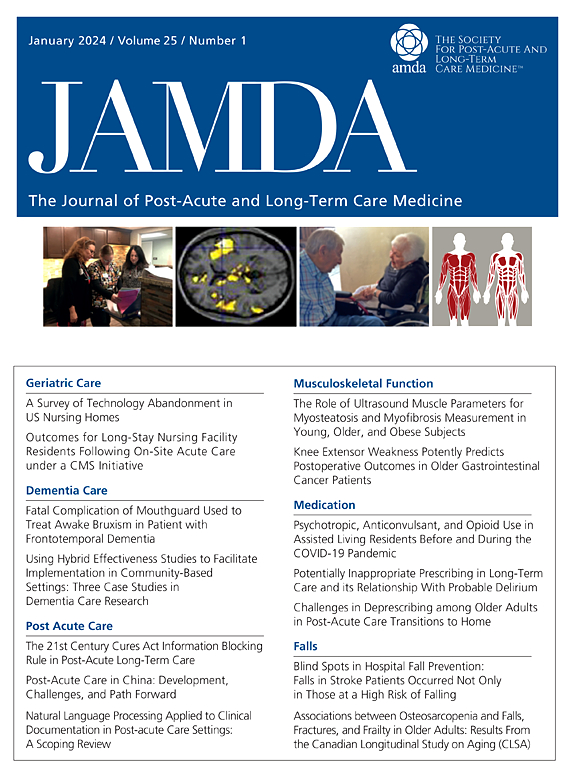植物性饮食模式与抑郁症状长期轨迹之间的关系:一项为期10年的纵向研究
IF 3.8
2区 医学
Q2 GERIATRICS & GERONTOLOGY
Journal of the American Medical Directors Association
Pub Date : 2025-06-18
DOI:10.1016/j.jamda.2025.105712
引用次数: 0
摘要
目的:先前的研究分析了植物性饮食模式与抑郁症状之间的关系。然而,对于以植物为基础的饮食模式与中国老年人抑郁症状的长期轨迹之间的关系,人们知之甚少。设计:回顾性队列研究。环境和参与者:在2008年至2018年期间,共有1666名年龄在65岁至65岁之间的人被纳入研究,他们有完整的饮食数据和4波抑郁症状的完整评估。方法:采用中国健康与寿命纵向调查(CLHLS)数据。我们在基线时使用简化的食物频率问卷来评估总体植物性饮食指数和不健康植物性饮食指数。抑郁症状通过参与者对5个问题的回答来评估。我们使用基于群体的轨迹模型来确定抑郁症状的轨迹,并使用多元逻辑回归来分析中国老年人植物性饮食模式与抑郁症状长期轨迹的关系。结果:该研究包括1666名老年人。我们确定了抑郁症状的3种轨迹。结果显示,植物性饮食指数最高的五分位数参与者不太可能处于中度抑郁轨迹(优势比[OR], 0.597;95% CI, 0.358-0.994)或高度进展性抑郁轨迹(or, 0.344;95% CI, 0.171-0.692)高于最低五分位数的患者。相比之下,不健康植物性饮食指数最高的五分之一处于中度抑郁轨迹的几率(OR, 2.750;95% CI, 1.555-4.863)或高度进展的抑郁轨迹(or, 6.168;95% CI, 3.014-12.623)增高。结论和意义:坚持植物性饮食模式与出现不良抑郁轨迹的可能性较低相关,而不健康的植物性饮食则与出现不良抑郁轨迹的可能性增加相关。本文章由计算机程序翻译,如有差异,请以英文原文为准。
Association Between Plant-Based Dietary Patterns and the Long-Term Trajectory of Depressive Symptoms: A 10-Year Longitudinal Study
Objectives
Previous studies have analyzed associations between plant-based dietary patterns and depressive symptoms. However, little is known about the association of plant-based dietary patterns with the long-term trajectory of depressive symptoms in older Chinese adults.
Design
Retrospective cohort study.
Setting and Participants
A total of 1666 individuals aged >65 years during the period from 2008 to 2018 were included, who had complete dietary data and complete evaluations of depressive symptoms in 4 waves.
Methods
Data from the Chinese Longitudinal Health and Longevity Survey (CLHLS) were used in this study. We used the simplified Food Frequency Questionnaire at baseline to assess the overall Plant-based Diet index and unhealthy Plant-based Diet Index. Depressive symptoms were assessed by participants' responses to 5 questions. We used a group-based trajectory model to determine the trajectory of depressive symptoms and used multiple logistic regression to analyze the association of plant-based dietary patterns with the long-term trajectory of depressive symptoms in older Chinese adults.
Results
The study included 1666 older adults. We identified 3 trajectories of depressive symptoms. The results showed that participants with the highest quintile of Plant-based Diet index were less likely to be on a moderate depression trajectory [odds ratio (OR), 0.597; 95% CI, 0.358-0.994] or a highly progressive depression trajectory (OR, 0.344; 95% CI, 0.171-0.692) than those with the lowest quintile. In contrast, the odds of the highest unhealthy Plant-based Diet Index quintile being on a moderate depression trajectory (OR, 2.750; 95% CI, 1.555-4.863) or a highly progressive depression trajectory (OR, 6.168; 95% CI, 3.014-12.623) were increased.
Conclusions and Implications
Adherence to plant-based dietary patterns was associated with a lower likelihood of being on an unfavorable depressive trajectory, whereas an unhealthy plant-based diet was associated with an increased likelihood of being on an unfavorable depressive trajectory.
求助全文
通过发布文献求助,成功后即可免费获取论文全文。
去求助
来源期刊
CiteScore
11.10
自引率
6.60%
发文量
472
审稿时长
44 days
期刊介绍:
JAMDA, the official journal of AMDA - The Society for Post-Acute and Long-Term Care Medicine, is a leading peer-reviewed publication that offers practical information and research geared towards healthcare professionals in the post-acute and long-term care fields. It is also a valuable resource for policy-makers, organizational leaders, educators, and advocates.
The journal provides essential information for various healthcare professionals such as medical directors, attending physicians, nurses, consultant pharmacists, geriatric psychiatrists, nurse practitioners, physician assistants, physical and occupational therapists, social workers, and others involved in providing, overseeing, and promoting quality

 求助内容:
求助内容: 应助结果提醒方式:
应助结果提醒方式:


